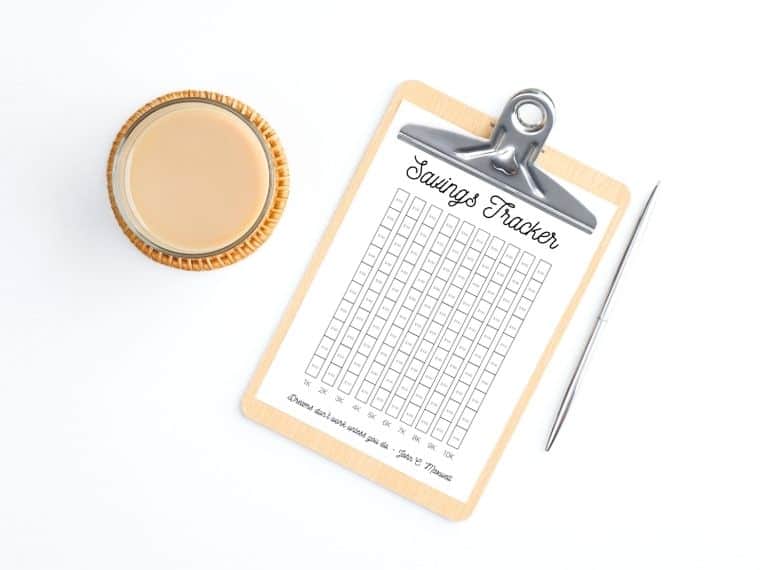
How I Saved $10,000 in One Year on a Tight Budget
Written: Editor | August 16, 2023

Creating a Budget
Are you looking to save $10,000 in just one year on a tight budget? With some careful planning and a bit of discipline, it's definitely possible!
Calculating your total income and expenses
To start, assess your financial situation by calculating your total income and expenses. Take into account all the money you earn each month and all the bills and other expenses you have. This will give you a clear picture of your financial standing and help you understand where you can make adjustments.
Identifying areas where you can cut back on expenses
To save a significant amount of money, you'll need to identify areas where you can cut back on expenses. In your budget, look for items that aren't necessities, such as eating out, entertainment, or subscriptions that you could temporarily do without. Consider alternative ways to reduce costs, like cooking at home instead of dining out or canceling unused memberships.
Creating a realistic budget plan
Now that you have identified areas to cut back on, it's time to create a realistic budget plan. Set specific savings goals and allocate a portion of your income towards them each month. Stick to this plan and track your expenses regularly to ensure you're staying on track.
Remember, saving $10,000 in a year might require some sacrifices, but with dedication and discipline, it's achievable. Good luck on your savings journey!

Cutting Back on Expenses
Reducing discretionary spending
If you're on a tight budget and want to save $10,000 in one year, cutting back on discretionary spending is a great place to start. Here are some tips to help you minimize unnecessary expenses:
-
Create a budget: Track your income and expenses to identify areas where you can cut back. Set specific spending limits for discretionary items like eating out, entertainment, and shopping.
-
Plan meals and eat at home: Eating out can quickly add up. Plan your meals ahead of time, pack your lunches, and cook at home as much as possible. This will not only save you money but also improve your culinary skills.
Tips for minimizing grocery costs
-
Make a shopping list: Plan your meals and create a shopping list before going to the grocery store. Stick to the list and avoid impulse purchases.
-
Shop sales and use coupons: Look for discounts and buy items on sale. Use coupons to save even more money on your groceries.
Exploring cost-effective entertainment options
-
Take advantage of free activities: Look for free events and activities in your community, such as museums, parks, and local festivals. These can provide entertainment without breaking the bank.
-
Budget-friendly subscriptions: Consider canceling expensive subscriptions and replacing them with lower-cost options, such as streaming services or library memberships.
Remember, saving money requires discipline and consistency. By making small changes and being mindful of your spending habits, you can reach your goal of saving $10,000 in one year, even on a tight budget.

Increasing Income
Exploring side hustle opportunities
If you're looking to save $10,000 in one year on a tight budget, increasing your income is a crucial step. Consider exploring side hustle opportunities to supplement your current earnings. Whether it's freelancing, tutoring, or starting a small business, finding a side gig can provide an additional stream of income to help reach your savings goal.
Negotiating a raise or promotion at work
Another way to boost your income is to negotiate a raise or promotion at your current job. Prepare a strong case by highlighting your achievements, taking on additional responsibilities, and showcasing your value to the company. Schedule a meeting with your supervisor to discuss your accomplishments and express your desire for growth within the organization. A well-prepared negotiation can lead to a salary increase or a higher position that aligns with your financial goals.
Remember, increasing your income is only one part of the equation. To save $10,000 in one year, dedicate a portion of your extra earnings towards your savings and stick to a budget. Cutting unnecessary expenses, prioritizing your savings goals, and being disciplined with your spending habits will ensure that you reach your financial target. With determination and smart money management, you can achieve your savings goal even on a tight budget.

Saving on Housing and Utilities
Tips for reducing rent or mortgage expenses
-
Consider downsizing: If you're living in a place that's larger than what you truly need, downsizing to a smaller and more affordable property can significantly reduce your housing expenses.
-
Negotiate your rent or mortgage: Approach your landlord or mortgage lender and see if you can negotiate a lower monthly payment. Highlight your reliability as a tenant or your loyalty as a customer to increase your chances of success.
-
Rent out a spare room: If you have an extra room in your home, consider renting it out to generate additional income that can be used towards your rent or mortgage.
Lowering utility bills through energy-saving practices
-
Switch to energy-efficient appliances: Investing in energy-efficient appliances like LED light bulbs, smart thermostats, and low-flow faucets can help save money on your utility bills in the long run.
-
Use energy-saving habits: Develop small habits like turning off lights when not in use, unplugging electronics when they're not needed, and adjusting your thermostat to conserve energy and reduce electricity costs.
-
Insulate your home: Adding insulation to your home can help regulate the temperature and reduce the need for excessive heating or cooling, leading to lower utility bills.
Remember, every penny counts when it comes to saving money. By implementing these tips and being mindful of your spending, you can successfully save $10,000 in one year, even on a tight budget.

Saving on Transportation
Public transportation alternatives and carpooling
If you're looking to save $10,000 in one year on a tight budget, one area where you can make a significant impact is transportation expenses. Here are a couple of tips to help you achieve that goal:
-
Consider using public transportation: Depending on where you live, public transportation can be a more affordable option compared to owning and maintaining a car. Research different public transportation options in your area and calculate the potential savings.
-
Carpool whenever possible: If public transportation isn't a viable option for you, consider carpooling with friends, family, or coworkers. By sharing the cost of fuel and maintenance, you can significantly reduce your transportation expenses.
Reducing maintenance and fuel costs
When it comes to your vehicle, there are several ways you can cut down on maintenance and fuel costs:
-
Keep up with regular maintenance: Properly maintaining your vehicle can prevent costly repairs in the long run. Follow the manufacturer's recommended maintenance schedule and address any issues promptly.
-
Improve fuel efficiency: Implement fuel-efficient habits, such as driving at a consistent speed, avoiding unnecessary idling, and using cruise control when possible. Additionally, consider carpooling or using alternative transportation methods for shorter trips to further reduce fuel consumption.
Remember, saving money requires discipline and commitment. By making small changes to your transportation habits, you can make a significant difference in your annual expenses and work towards saving $10,000.

Saving on Food and Shopping
Meal planning and cooking at home
One of the most effective ways to save money on a tight budget is by meal planning and cooking at home. By planning your meals in advance, you can create a grocery list and stick to it, avoiding impulse purchases. Cooking at home allows you to control the ingredients and portion sizes, which can lead to significant savings over eating out. Additionally, it gives you the opportunity to try new recipes and improve your culinary skills. Don't be afraid to batch cook and freeze leftovers for quick and easy meals on busy days.
Using coupons and shopping sales
Another great way to save money is by using coupons and shopping sales. Keep an eye out for coupons in newspapers, magazines, or online coupon websites. Many grocery stores also have their own loyalty programs that offer discounts and exclusive deals for members. Take advantage of these opportunities to stock up on essentials or items you frequently use when they are on sale. Remember to compare prices and consider purchasing store brands, as they are often cheaper and still offer quality products. When shopping online, look for promo codes or discounts before making a purchase. It may take a little extra effort, but the savings can add up quickly.
By incorporating these strategies into your daily life, you can save $10,000 in one year while still living on a tight budget. Remember, every small saving counts, and with determination and consistency, you can achieve your financial goals.

Automating Savings
Setting up automatic transfers to a savings account
If you're looking to save $10,000 in a year on a tight budget, automating your savings is a smart strategy. Set up automatic transfers from your checking account to a dedicated savings account. Determine an amount that fits within your budget and schedule the transfers to occur on a regular basis, such as weekly or monthly. By doing this, you’ll be consistently saving and building up your savings without even thinking about it.
Utilizing money-saving apps and tools
To help you reach your $10,000 saving goal on a tight budget, take advantage of money-saving apps and tools. There are numerous apps available that track your spending, create budgets, and find discounts or deals. These apps can help you identify areas where you can cut back on expenses and save more money. Additionally, consider using online tools that analyze your spending habits and provide personalized recommendations on saving opportunities.
Remember, saving $10,000 in a year on a tight budget requires discipline and prioritization. Cut back on unnecessary expenses, find creative ways to save, and stick to your savings plan. With automated transfers and the help of money-saving apps, you can gradually build up your savings and reach your financial goal.

Staying Disciplined and Motivated
Saving $10,000 in one year on a tight budget may seem like an impossible task, but with the right mindset and strategies, it can be achieved. Here are some key points to help you stay disciplined and motivated throughout your savings journey.
Setting realistic goals and milestones
-
Define your goal: Start by setting a specific savings goal of $10,000 and break it down into smaller milestones. This will make it more manageable and less overwhelming.
-
Create a budget: Analyze your income and expenses to identify areas where you can cut back or save. Prioritize your spending, focusing on necessities while minimizing discretionary expenses.
-
Automate your savings: Set up automatic transfers from your checking account to a separate savings account. This way, you won't even have to think about saving – it will happen automatically.
Seeking support from friends and family
-
Share your goal: Let your close friends and family members know about your savings goal. They can provide support, encouragement, and hold you accountable throughout the process.
-
Find frugal activities: Look for free or low-cost activities to do with your loved ones. This can help you save money while still enjoying quality time together.
-
Join online communities: Participate in online forums or groups that focus on saving money and frugal living. This will expose you to tips and advice from like-minded individuals who are also striving to achieve financial goals.
Remember, saving $10,000 in one year requires discipline, determination, and sacrifice. Stay focused on your goal, celebrate your milestones along the way, and you'll be surprised at how much you can achieve.

Conclusion
Saving $10,000 may seem like a daunting task, especially when you're on a tight budget. However, with determination, discipline, and some smart strategies, it is definitely achievable. By following the tips mentioned above, you can start building your savings and reach your goal within a year.
Remember, every small step counts. Start by creating a budget, reducing unnecessary expenses, and finding ways to increase your income. Keep track of your progress and stay motivated along the way.
Frequently Asked Questions: How to Save $10,000 on a Tight Budget
Q: How can I start saving money when I have a limited budget?
A: Start by creating a budget and tracking your expenses. Identify areas where you can cut back, such as eating out less or reducing entertainment expenses. Look for ways to save on everyday expenses, such as shopping for discounts and using coupons.
Q: How can I increase my income to save more money?
A: Consider taking on a side hustle or freelance work to supplement your income. Look for opportunities to monetize your skills or hobbies. You can also explore options like renting out unused space or selling unwanted items.
Q: Are there any apps or tools that can help me track my savings progress?
A: Yes, there are many budgeting apps available that can help you track your expenses and savings goals. Some popular options include Mint, YNAB (You Need a Budget), and Personal Capital.
Remember, saving money requires discipline and consistency. Stay focused on your goal and make the necessary adjustments to your spending habits. With determination and perseverance, you can save $10,000 on a tight budget.



